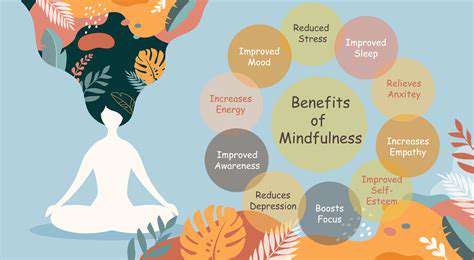The Transformative Benefits of Daily Mindfulness Practice
The Essence of Mindfulness
The Core Principles of Mindfulness
Mindfulness is rooted in ancient practices, drawing primarily from Buddhist traditions. It emphasizes living in the present moment, cultivating awareness, and fostering acceptance of one’s thoughts and feelings without judgment.
One of the core principles is attention. Mindfulness teaches you to focus fully on what you are doing, whether it’s eating, walking, or even breathing. This attention to detail enhances your ability to appreciate life’s little moments.
Another important aspect is acceptance. Mindfulness encourages individuals to observe their thoughts and emotions without labeling them as good or bad. This sense of acceptance can lead to greater emotional resilience and a stronger sense of self.
Moreover, mindfulness is not about emptying the mind; rather, it’s about acknowledging the thoughts that arise, understanding their transitory nature, and letting them go without creating attachments.
Incorporating these principles into daily practice can lead to profound changes in perception and emotional well-being, offering a greater sense of peace and clarity amid life’s challenges.
Practical Techniques for Daily Mindfulness
There are several techniques one can use to cultivate a daily mindfulness practice. Meditation is perhaps the most well-known method, involving sitting quietly and focusing on breath or body sensations to anchor your awareness.
Body scans are another effective technique. This involves lying down comfortably and intentionally focusing attention on different parts of the body, promoting relaxation and fostering body awareness.
Mindful walking is an accessible practice that can be done anywhere. By paying close attention to the sensation of your feet touching the ground and the rhythm of your breath, you can transform a routine walk into a mindful experience.
Even daily activities such as eating can become mindfulness practices. Chewing slowly and savoring each bite allows you to fully engage with the experience of nourishment, enhancing your enjoyment and connection to food.
Lastly, one can integrate mindfulness into transitions between activities throughout the day. Taking a few moments to pause and breathe before shifting tasks can help maintain inner calm and focus.
The Impact of Mindfulness on Mental Health
Research has shown that regular mindfulness practice can significantly improve mental health outcomes. It has been linked to reduced symptoms of anxiety and depression, providing individuals with tools to cope more effectively with stress.
Mindfulness enhances emotional regulation by promoting awareness of emotions as they arise. This can prevent overwhelming feelings from spiraling out of control, making it easier to manage them in a productive way.
Additionally, engaging in mindfulness can boost resilience. It allows individuals to develop a greater understanding of their thought patterns, leading to healthier responses in the face of adversity.
Furthermore, mindfulness practices have been shown to improve concentration and attention span, counteracting the distractions of everyday life. This increased focus can lead to better performance in both personal and professional realms.
In summary, by fostering a mindful approach to life, individuals can create a positive feedback loop of mental health benefits, cultivating inner peace and a greater sense of fulfillment.
Physical and Mental Health Benefits
Improved Stress Management
In our fast-paced world, stress has become a common challenge that affects countless individuals. Daily mindfulness practice equips people with tools to manage and alleviate stress effectively. By focusing on the present and observing thoughts without judgment, individuals can reduce anxiety and cultivate a sense of calm.
Moreover, mindfulness techniques, such as deep breathing and body scans, activate the relaxation response in the body. This physiological change counteracts the stress response, leading to decreased heart rate and blood pressure, ultimately promoting a healthier state of being.
Enhanced Emotional Regulation
Regular engagement in mindfulness practices fosters emotional intelligence, helping individuals to recognize and process their emotions more effectively. This awareness allows for better responses to difficult situations and reduces impulsive reactions driven by strong feelings.
By cultivating a non-reactive awareness of emotions, individuals learn to approach challenges with a balanced mindset. This can lead to improved relationships and an overall increase in personal satisfaction, as individuals are less likely to externalize their frustrations or internalize negativity.
Boosted Focus and Concentration
Mindfulness practice has been shown to significantly enhance focus and concentration. Regularly engaging in mindfulness exercises trains the brain to resist distractions and maintain attention on the task at hand. This is particularly beneficial in academic and professional settings where sustained attention is crucial for productivity.
Studies suggest that even short bouts of mindfulness practice can improve cognitive flexibility and information retention. By sharpening the mind’s ability to concentrate, individuals can work more efficiently, leading to a sense of accomplishment and reduced fatigue.
Greater Self-Awareness and Acceptance
Daily mindfulness practice encourages individuals to develop a deeper understanding of themselves and their behaviors. This self-awareness can lead to greater self-acceptance, as practitioners learn to embrace their thoughts and feelings without harsh self-criticism.
As individuals become more attuned to their inner experiences, they can identify habitual patterns that may be counterproductive. This realization often paves the way for positive change, as mindfulness empowers individuals to make conscious choices that align with their true values and aspirations.
Starting Your Mindfulness Practice
Understanding Mindfulness
Mindfulness is defined as the psychological process of bringing one's attention to the present moment. This practice can involve various techniques such as meditation, breathing exercises, or mindful walking. By focusing on the here and now, individuals can cultivate greater awareness and appreciation of their experiences.
One of the core principles of mindfulness is acceptance. Rather than avoiding or suppressing difficult emotions, practicing mindfulness encourages embracing them without judgment. This acceptance can lead to a healthier relationship with one’s thoughts and feelings.
Research has shown that mindfulness can have numerous psychological benefits, including reducing stress and anxiety, improving emotional regulation, and increasing overall well-being. These benefits make mindfulness a powerful tool for enhancing mental health.
Creating a Mindfulness Routine
Establishing a daily mindfulness routine can help integrate this practice into your life. Start small by setting aside just five to ten minutes each day to focus on your breathing or engage in mindful meditation. Gradually increase the time as you become more comfortable with the practice.
Incorporating mindfulness into everyday activities can also be effective. Consider practicing mindfulness during mundane tasks such as eating, walking, or even washing dishes. This approach helps reinforce the habit of being present and aware throughout the day.
Consistency is key to a successful mindfulness routine. To maintain motivation, try setting reminders or establishing a specific time each day dedicated to your practice, thereby making it a non-negotiable part of your daily life.
Overcoming Challenges in Mindfulness Practice
Many people encounter challenges when starting their mindfulness practice, such as a wandering mind or difficulty in staying focused. It's essential to recognize that these obstacles are a normal part of the journey. Instead of becoming frustrated, acknowledge these distractions and gently guide your attention back to the present moment.
Another common hurdle is finding the time to practice mindfulness. Life can be busy, but prioritizing your well-being is crucial. Look for small pockets of time throughout your day, like during your commute or waiting in line, where you can engage in brief mindfulness exercises.
Building patience is vital for overcoming challenges in mindfulness. Progress may feel slow, but consistently returning to the practice can lead to significant benefits over time. Remember that mindfulness is a skill that evolves with regular practice, and it's okay to have ups and downs along the way.
The Long-term Benefits of Mindfulness
As you continue your daily mindfulness practice, you may start to notice profound changes in your emotional and mental landscape. Long-term practitioners often report increased resilience to stress, improved relationships, and a greater sense of overall happiness.
Studies indicate that mindfulness can also lead to structural changes in the brain, particularly in areas related to attention, emotion regulation, and self-awareness. This neuroplasticity means that the practice truly has the potential to transform your cognitive patterns and emotional responses.
Incorporating mindfulness into your life is not just a fleeting trend; it fosters a deeper connection with yourself and the world around you. Ultimately, the long-term benefits of a consistent mindfulness practice can pave the way for a more balanced, fulfilling life.
Integrating Mindfulness into Daily Life

Creating a Mindful Morning Routine
Establishing a morning routine focused on mindfulness can set a positive tone for the entire day. Incorporating practices such as meditation, deep breathing, or gentle yoga can enhance mental clarity and focus.
Starting the day with intentional activities allows individuals to engage with their thoughts and feelings more deeply. By taking the time to be present each morning, one can cultivate a sense of calm and readiness for the challenges ahead.
Mindfulness at Work
Integrating mindfulness techniques throughout the workday can significantly improve productivity and reduce stress. Simple practices, such as taking short breaks to breathe deeply or to focus on your surroundings, can recharge your mental state.
These mindful moments not only help in managing stress but also enhance creativity and collaboration among colleagues. When individuals practice mindfulness together, they foster a supportive environment that encourages open communication and teamwork.
Mindful Eating Habits
Practicing mindfulness during meals can transform the way we interact with food. By paying close attention to the tastes, textures, and aroma of our meals, we can develop a healthier relationship with what we eat. This practice helps in recognizing hunger cues and promotes more balanced eating habits.
Mindful eating encourages us to savor each bite rather than rushing through meals. As we become more attuned to our bodies, we can make more thoughtful choices that contribute to overall well-being.
Evening Reflection and Mindfulness
Creating an evening routine that incorporates reflection can help to process the day's events and emotions. Taking time to journal or meditate can be beneficial for mental health. This reflective practice allows for better understanding of experiences and fosters a sense of gratitude.
Ending the day with mindfulness prepares the mind for restorative sleep and promotes a sense of closure. When individuals consistently engage in this practice, they are more likely to wake up refreshed and centered, ready to embrace a new day.











